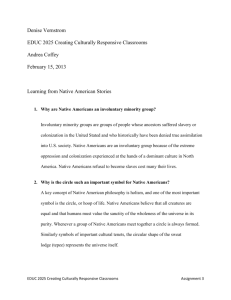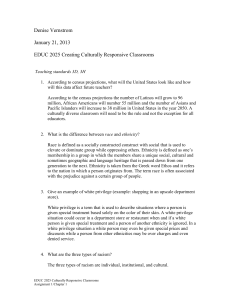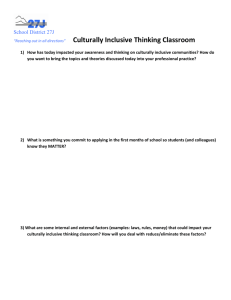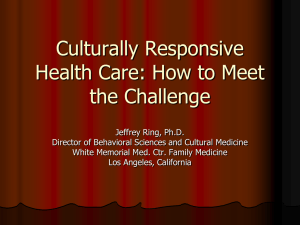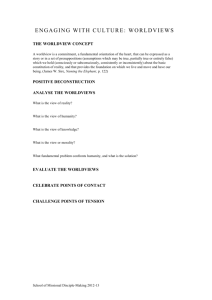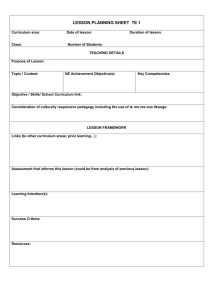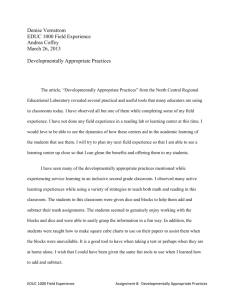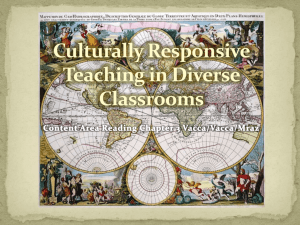EDUC 2025 Syllabus Spring 2013 Online Class
advertisement
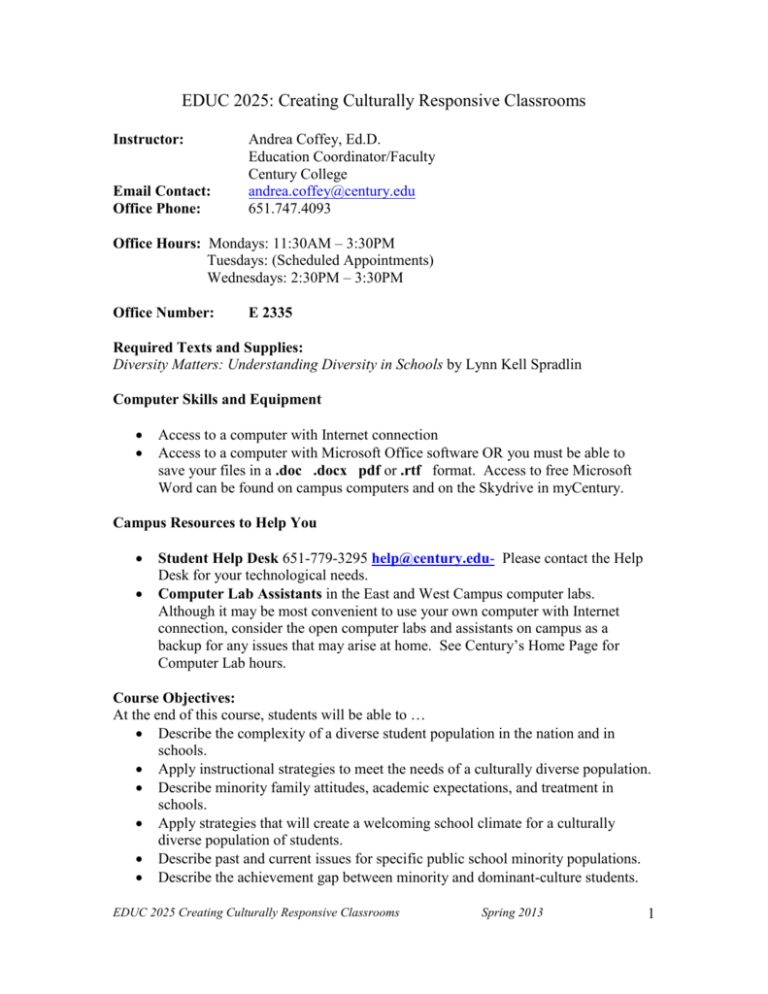
EDUC 2025: Creating Culturally Responsive Classrooms Instructor: Email Contact: Office Phone: Andrea Coffey, Ed.D. Education Coordinator/Faculty Century College andrea.coffey@century.edu 651.747.4093 Office Hours: Mondays: 11:30AM – 3:30PM Tuesdays: (Scheduled Appointments) Wednesdays: 2:30PM – 3:30PM Office Number: E 2335 Required Texts and Supplies: Diversity Matters: Understanding Diversity in Schools by Lynn Kell Spradlin Computer Skills and Equipment Access to a computer with Internet connection Access to a computer with Microsoft Office software OR you must be able to save your files in a .doc .docx pdf or .rtf format. Access to free Microsoft Word can be found on campus computers and on the Skydrive in myCentury. Campus Resources to Help You Student Help Desk 651-779-3295 help@century.edu- Please contact the Help Desk for your technological needs. Computer Lab Assistants in the East and West Campus computer labs. Although it may be most convenient to use your own computer with Internet connection, consider the open computer labs and assistants on campus as a backup for any issues that may arise at home. See Century’s Home Page for Computer Lab hours. Course Objectives: At the end of this course, students will be able to … Describe the complexity of a diverse student population in the nation and in schools. Apply instructional strategies to meet the needs of a culturally diverse population. Describe minority family attitudes, academic expectations, and treatment in schools. Apply strategies that will create a welcoming school climate for a culturally diverse population of students. Describe past and current issues for specific public school minority populations. Describe the achievement gap between minority and dominant-culture students. EDUC 2025 Creating Culturally Responsive Classrooms Spring 2013 1 Define the role of a classroom teacher in a culturally diverse school. Define terminology related to inbstructional strategies for a diverse population of students. Students completing EDUC 2025 will also be able to demonstrate the following competencies or standards: Core Competencies for Paraeducators: 1.1 Sensitivity to the beliefs, traditions, and values across cultures and how these impact the relationships between children, families, and schooling. 2.3 Knowledge of and respect for the diverse backgrounds (cultural, linguistic, environmental) of students and how these characteristics affect the student’s life and learning. 4.2 Awareness of the challenges and expectations of various learning environments. 7.3 Ability to be sensitive and respectful in communications regarding all children and families—regardless of differences in cultural heritage, lifestyle, values, and home environment. (Opportunity to practice this in a school setting.) 8.5 Ability to show respect for the diversity of students. Standards of Effective Practice: (Standard 3, Diverse Learners) 3D. Understand how to recognize and deal with dehumanizing biases, discrimination, prejudices, and institutional and personal racism and sexism. 3E. Understand how a student’s learning is influenced by individual experiences, talents, and prior learning, as well as language, culture, family, and community values. 3F. Understand the contributions and lifestyles of the various racial, cultural, and economic groups in our society. 3H. Understand cultural and community diversity; and know how to learn about and incorporate a student’s experiences, cultures, and community resources into instruction. 3J. Know about community and cultural norms. 3O. Use information about students’ families, cultures, and communities as the basis for connecting instruction to students’ experiences. EDUC 2025 Creating Culturally Responsive Classrooms Spring 2013 2 3P. Bring multiple perspectives to the discussion of subject matter, including attention to a student’s personal, family, and community experiences and cultural norms. 3Q. Develop a learning community in which individual differences are respected. **Please note: The competencies and standards included in this syllabus are the minimum objectives that will be covered in the class. Work Submission Guidelines: Assignments and discussion posts will need to be completed by Sunday evenings at 11:59PM. The assignments will be turned in using the dropbox. The dates for individual dropbox submissions will be posted in the dropbox; after 11:59PM, the dropbox will close for each assignment. Assignments and discussions will include a variety of teaching/learning experiences that are relevant to the role of the teacher/paraeducator in a diverse classroom setting. Students are expected to read assigned material, turn in assignments, and participate in discussions. All students currently working on portfolios are encouraged to continue to update their professional portfolios during the semester. Academic and Professional Honesty Academic honesty and integrity are integral to the academic process. It is expected that Century College students will understand and adhere to the concept of academic integrity and to the standards of conduct prescribed by the college’s Policy on Academic Honesty. The Student conduct and Academic Honesty Policy is available in the Counseling Center, West Campus, or from the Associate Dean of Student Life, Room 2242, West Campus – 651-773-1780. Student’s Right to Know: Century College is committed to the safety and security of its students and employees, and asks that you read the “Right to Know” information carefully. This information is being supplied to you in compliance with state and federal laws and the Minnesota State Colleges and Universities regulations. The Right to Know brochure is available in the Counseling Center (Room 2410 West Campus), in brochure displays at the main entrances of all campus buildings, by calling 651-779-3929, or on the Century College web site at: http://www.century.mnscu.edu/studentlife/handbook/cprighttoknow.html. Access/Accommodations: The Access Center is a Student Services Office which provides accommodation, advocacy, support and referral information for students with various types of physical, psychological, or learning disabilities. Based on the individual needs of the students, services may include, but are not limited to, early registration, note-taking, test-taking accommodations, and the provision of sign language interpreters. Services are also available for students with temporary and/or suspected disabilities. Documentation must be provided within the first semester of service. EDUC 2025 Creating Culturally Responsive Classrooms Spring 2013 3 The Access Center ensures the rights of disabled students and assists Century College in meeting its obligations under the Rehabilitation Act of 1973 (P.L.93-112, Section 504) and the Americans with Disabilities Act. The Center’s commitment is to remove educational, programmatic and attitudinal barriers, allowing students with disabilities equal access and opportunity to participate fully in all education programs and activities. This is made possible by the provision and arrangement of reasonable accommodations on a campus-wide level. Services provided are based on individual need. Grading Procedures: Grades will be based on the following: Assignments (assignments to be submitted into the dropbox) 500 points Reflection Paper 100 points Participation (online discussions) You are expected to write your own response to the discussion questions and respond to the posts of one other student (minimum expectation for the discussion points). 100 points Grading Scale: 90 – 100% 80 – 89% 70 – 79% 60 – 69% Below 60% A B C D F Week of January 14, 2013 Introduction to each other on the Discussion Board. Read Chapter 1 and submit the first assignment in the D2L Dropbox. Chapter 1—Understanding What It Means to Have a Marginalized Status in the United States: Defining Marginalization and Terminology. Assignment 1 due January 20, 2013. Week of January 21, 2013 Chapter 2— Minority Family Attitudes, Academic Expectations, and Treatment in Schools. Focus on common school-related attitudes and expectations, ways in which schools may alienate minority families, minority family confusion about schools and teachers--barriers that separate families of minority students from schools. Assignment 2 is on tracking. Assignment 2 due January 27, 2013. Week of January 28, 2013 Discussion question on this chapter. No assignment on the chapter. Chapter 3—School Climate: Effects on Minority Student Achievement and Socio-emotional Adjustment. Topics of discussion: the dimensions of school climate, the effects of school climate on the academic success of students, elements of positive school climate, areas of conflict EDUC 2025 Creating Culturally Responsive Classrooms Spring 2013 4 between minority family attitudes and expectations and some elements of school climate, and barriers to effective home-school communication. Week of February 4, 2013 Read Chapter 4—The Classroom Teacher: A Powerful Influence. Focus on teacher qualities that affect student achievement, qualities that encourage student psychosocial adjustment, ways a teacher can demonstrate value for students, and qualities needed to effectively facilitate the learning and development of minority students. There will be a discussion question on this chapter instead of an assignment. This is an important chapter to review when you are writing your reflection paper for the course. Week of February 11, 2013 Assignment 3 and discussion question based on Chapter 5—Learning from Native American Stories. Topics of discussion include the early experience of Native Americans, values held by traditional Native Americans, and coping strategies. Assignment 3 and discussion due on February 17, 2013. Week of February 18, 2013 Assignment 4 and discussion question based on information found in Chapter 6— Learning from Asian American Stories. Focus on common values and worldviews, coping strategies utilized by Asian Americans, and classroom strategies for integrating Asian American worldviews into the curriculum. Assignment 4 and discussion due on February 24, 2013. Week of February 25, 2013 Assignment 5 and discussion question based on Chapter 7—Learning from Latino/a Stories. Topics for discussion include common values and worldviews of Latino/as, coping strategies, classroom strategies. Assignment 5 and discussion question due on March 3. Week of March 4, 2013 Assignment 6 and discussion question based on information found in Chapter 8— Learning from African American Stories. Focus on common African American values and worldviews, coping strategies, and classroom strategies. Assignment 6 and discussion due on March 11, 2013. Week of March 11, 2013 Discussion questions this week. No assignments. Be thinking about what you will include in your course reflection paper. Week of March 18, 2013 No online assignment or discussion—SPRING BREAK! EDUC 2025 Creating Culturally Responsive Classrooms Spring 2013 5 Week of March 25, 2013 Discussion question this week based on information found in Chapter 9—Learning from Working-Class Stories. Focus on the common values and worldviews of working-class citizens in the United States, coping strategies, and classroom strategies for cultivating positive relationships with students from poor and working-class families. Discussion responses due on March 31, 2013. Week of April 1, 2013 Discussion question this week based on information found in Chapter 10—Learning from Women’s Stories. Topics include: values and worldviews commonly shared by women in the United States, coping strategies utilized by women as they confront discrimination and pressures of dominant culture, and classroom strategies. ** Course Reflection Paper Due** The course reflection paper and the discussion responses due on April 7, 2013. Week of April 8, 2013 Assignment and discussion question this week based on information found in Chapter 11—Learning from Gay and Lesbian Students’ Stories. Focus on common values and worldviews of gay and lesbian people in the United States, coping strategies, and classroom strategies. Assignment 7 and discussion question responses due April 14, 2013. Week of April 15, 2013 Assignment and discussion question this week based on information found in Chapter 12—Learning from the Stories of People with Disabilities. Topics include significant sociopolitical changes that have occurred in the process of incorporating persons with disabilities in dominant culture, coping strategies, and classroom strategies. Assignment 8 and discussion question responses due April 21, 2013. Week of April 22, 2013 Assignment and discussion based on information found in Chapter 13—Understanding the Achievement Gap between Minority and Dominant Culture Students. Assignment 9 and discussion question responses due on April 28, 2013. Week of April 29, 2013 Assignment and discussion based on information found in the last chapters of the text and on the assigned website. Assignment 10 and discussion question responses due on May 5, 2013. Week of May 6, 2013 This week is for scheduled student conferences. If I do not contact you this week, you are finished with the course! Have a great summer! EDUC 2025 Creating Culturally Responsive Classrooms Spring 2013 6
